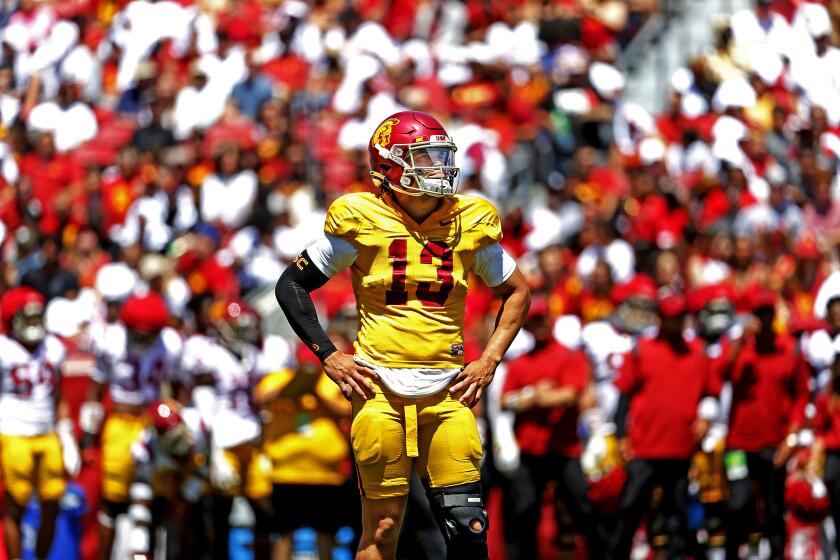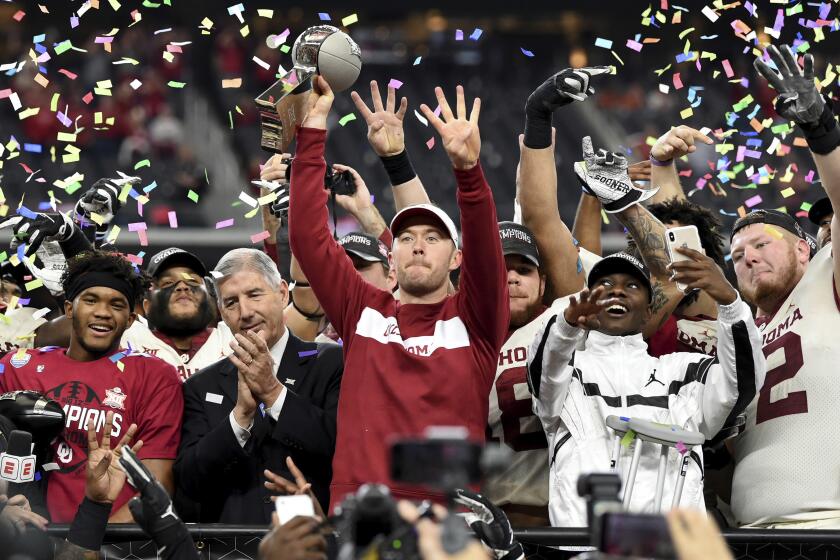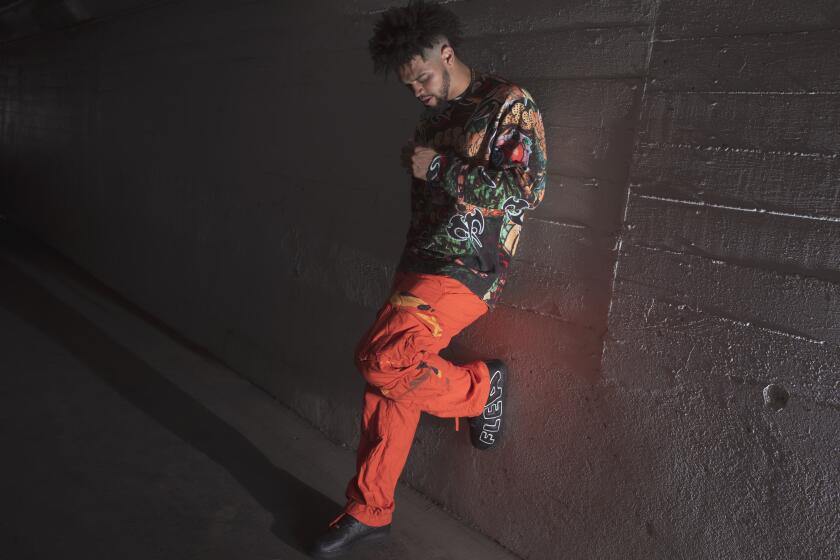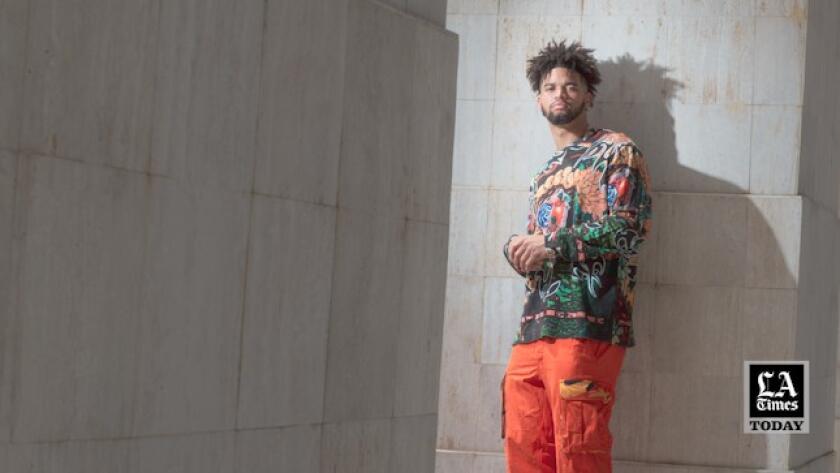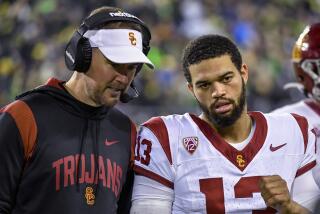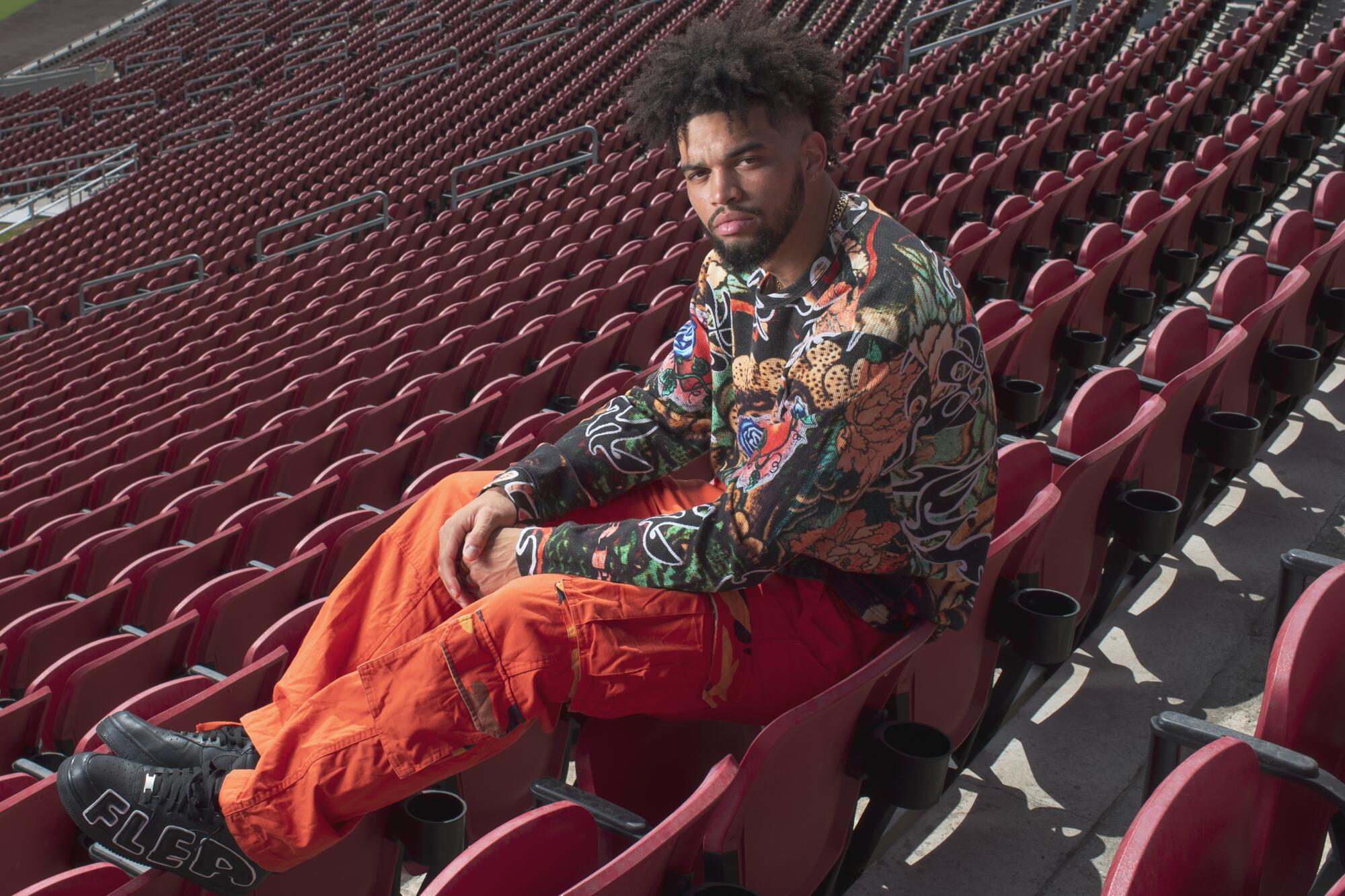
- Share via
The plan that propelled Caleb Williams to the forefront of a new college football era first came into focus long before the landscape changed, years ahead of his arrival at USC, when the notion of an amateur quarterback making millions off his name, image and likeness still felt impossible.
Carl Williams had a knack for seeing into the future. As a commercial real estate developer in the Washington D.C. area, Carl always tried to stay two steps ahead, considering every variable, anticipating every tectonic shift before the ground shook beneath him.
He wanted the same for his son. That had been their plan ever since 10-year-old Caleb cried in the backseat of their car after a deeply frustrating loss, telling his father how desperately he wanted to be great. Twice, Carl asked his son if he really meant it, and twice Caleb assured he did. And from that moment forth, his father did everything in his power to propel Caleb to those heights, surrounding him with a team of experts, coaches and mentors, sparing no expense in helping him reach his potential as a quarterback.
Caleb swam regularly. He did hot yoga. He kept a special diet. He saw a sports psychologist. Anything for him to get closer to his dream.
“Everything we do is to prepare for where we want to go,” Carl says.
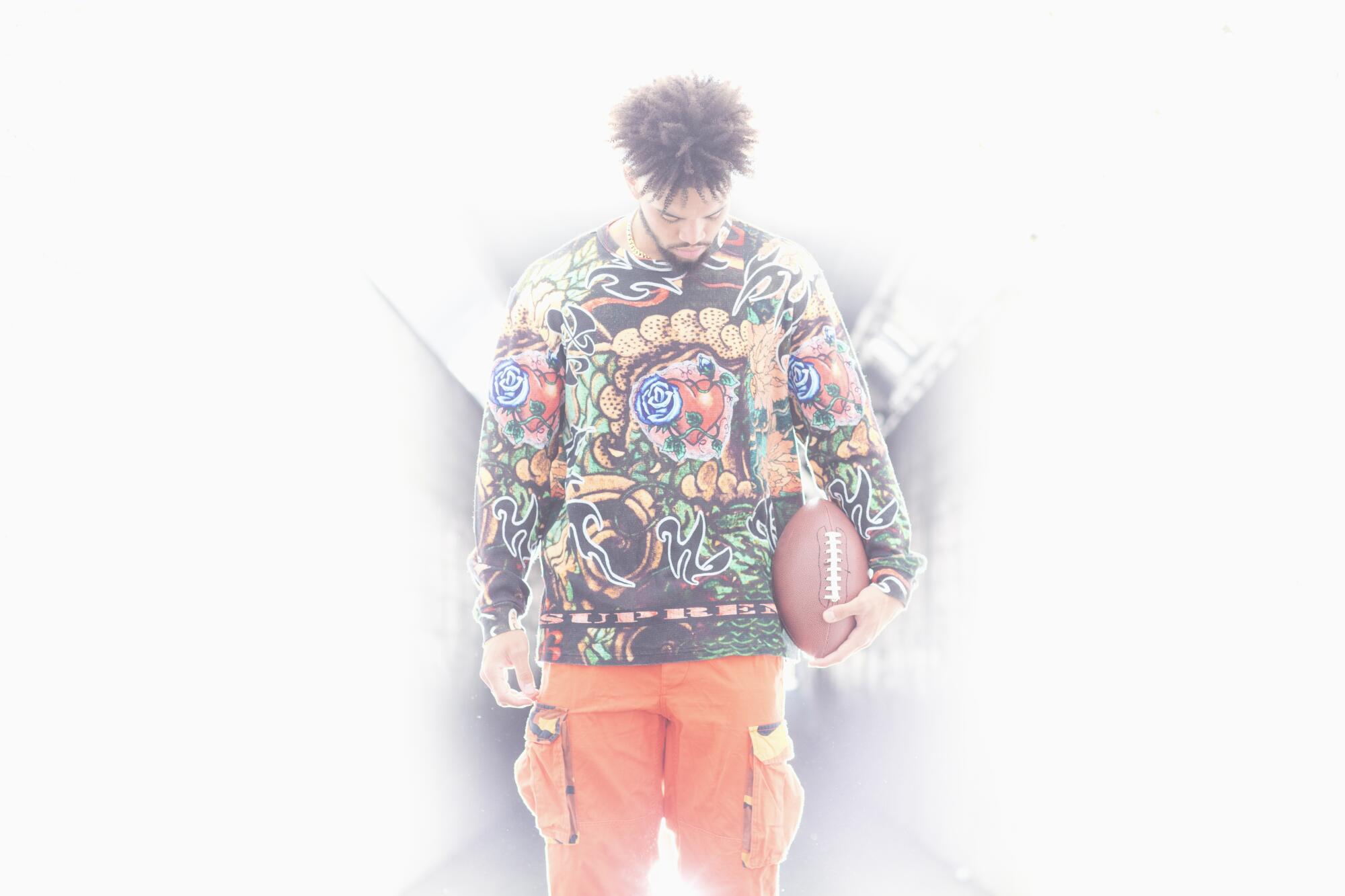
They applied the same principle to NIL. But with NIL there were no guardrails, no precedents, no templates to help a family prepare. So Carl and his business partners, who together own a D.C. area gym, sketched out their own plans with Caleb’s help while he was still a junior in high school. They compiled lists of brands, built pitch decks and wrote mission statements, all geared toward not only maximizing Caleb’s marketability but keeping him “above the chaos” they expected was inevitable when pay restrictions finally lifted.
“We knew he was going to be one of the faces to carry college football,” says Russ Thomas, one of Carl’s business partners and a mentor to Caleb. “We just wanted to stay focused on what was ahead.”
The Williams family eventually enlisted the help of Smith & Company, a strategic marketing and communications firm, to help Caleb succeed as a college football player and an endorsement leader. Together, they developed a plan for NIL unlike any other in the space, one they’re convinced doesn’t just set Caleb up in the long-term, but all other athletes who might decide to follow in his footsteps. Already, Carl speaks weekly with the father of USC’s next five-star quarterback prospect, Malachi Nelson.
“His family saw where the landscape was going,” said Cody Boulware, a vice president at Smith & Company who serves as Caleb’s manager. “They had a vision.”
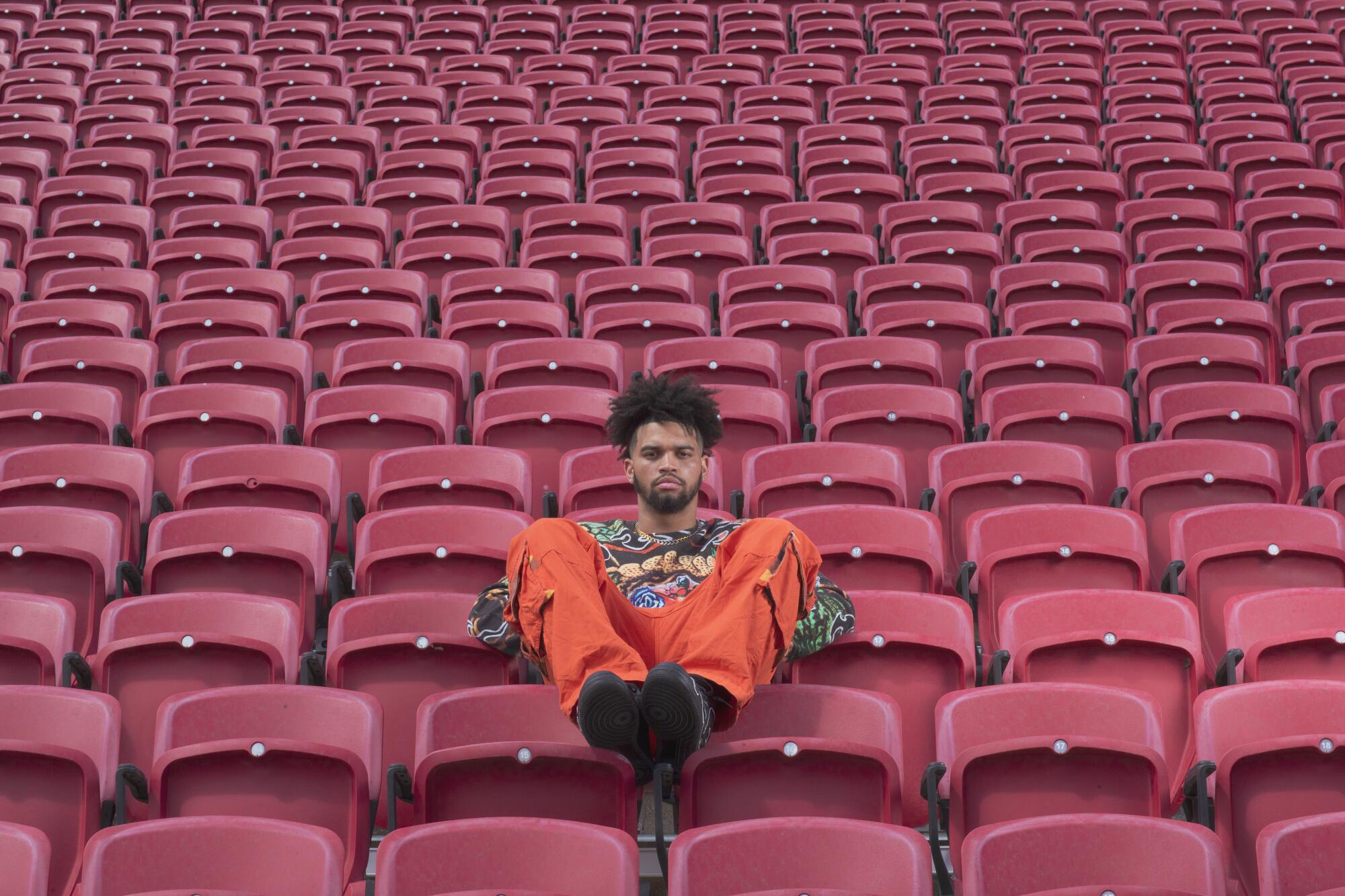
That vision, years later, would lead Caleb Williams and three of his Trojan teammates via car service to a football field in Santa Clarita, where cameras would capture USC’s new quarterback as part of a digital ad campaign for AC+ION Water, an ion-charged alkaline water brand for which he is now the company’s face.
Such a scene might have been unthinkable just a few years earlier — a major college quarterback hawking bottled water in his free time — but for USC’s new star passer, it’s just another obligation in a list that seems to grow longer by the day.
“It’s been smooth. It’s been fun, finally being able to make some money. But the main objective is to win championships.”
— USC quarterback Caleb Williams
AC+ION Water is one of many NIL deals that Caleb has signed since last July, when the restrictions on NIL were lifted; though, he and his team prefer the term “partnership.”
Brought in to help launch the company, Caleb seems to have held up his end of that bargain so far. During a February appearance on “Good Morning America,” he casually dropped the company’s name into his interview. The result? “A lot of eyeballs,” said KC Blinn, vice president of marketing at BlueTriton Brands, which owns AC+ION Water.
Even the host, Robin Roberts, seemed impressed. “You’re already a pro doing that,” she said, with a laugh.
Except most pros don’t have a portfolio on par with what Williams has put together before taking a snap at USC. Since February, when he first transferred to USC from Oklahoma, Williams announced a major deal with Beats headphones, inked an agreement with Topps trading cards and became the only college athlete to license his memorabilia with Fanatics, where fans can now purchase a USC helmet with his autograph for a cool $599.99.
Transfer quarterback Caleb Williams exuded confidence and embraced his role as a leader Saturday in USC’s spring football game at the Coliseum.
And those are just the more conventional deals he’s signed. His long-term partnership with Hawkins Way, a Beverly Hills-based real estate private equity fund, is believed to be the only NIL deal of its kind. He’s the only known college football player to pursue equity as part of his NIL portfolio. Williams now owns a stake in a men’s grooming company (Faculty), an NFT marketplace (Hall of GOATs), and most recently, a mood-altering sunglasses company (FutureMood).
“He really is a pioneer,” said Greig Carlson, CEO of Hall of GOATs.
But in breaking new ground, Caleb is still wary of giving the wrong impression. He’s not here in L.A. to improve his portfolio. He’s here to be a better football player — and hopefully propel himself to the front of the 2024 NFL draft, where, his dad happily points out, the deals dwarf any he might earn in college.
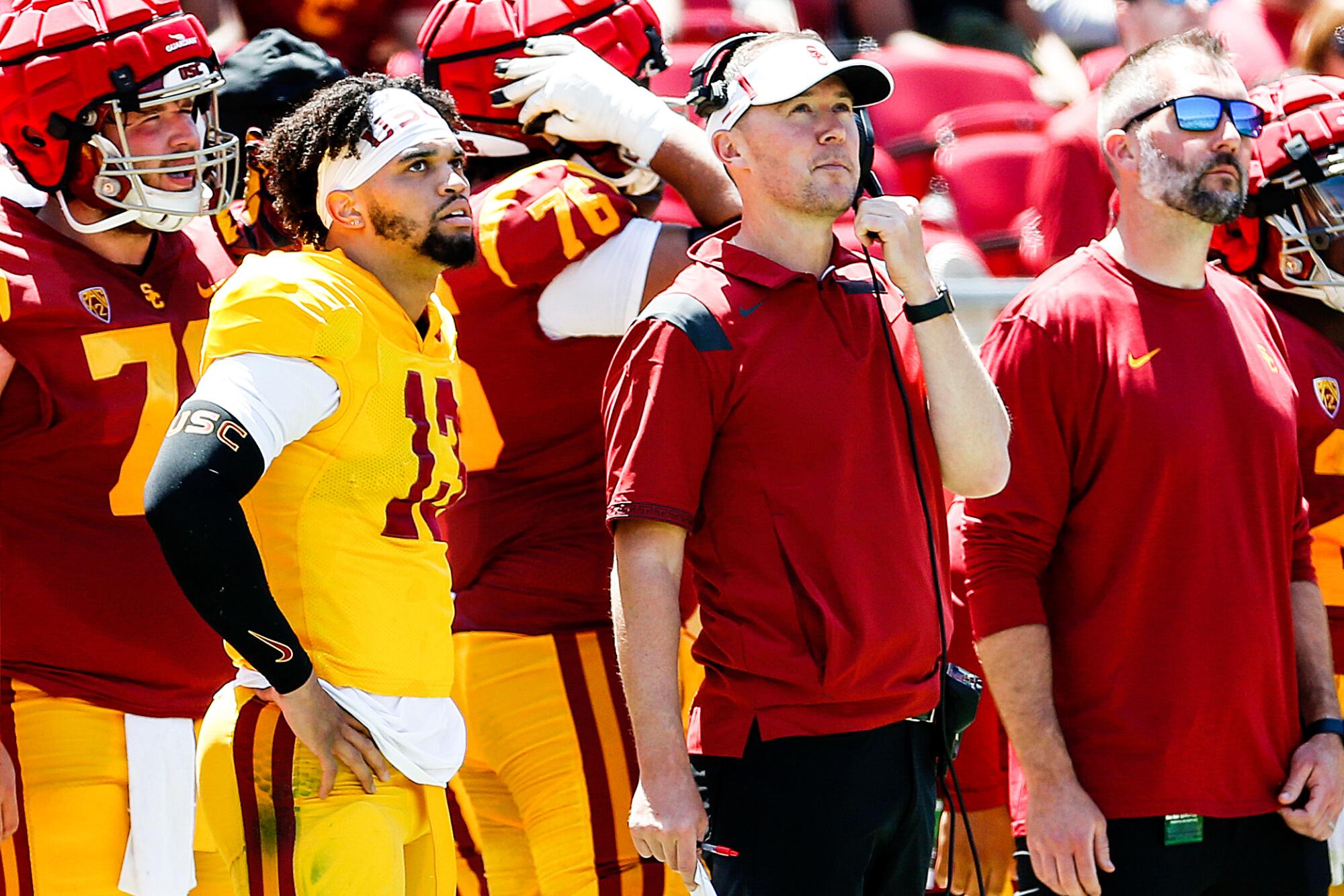
“It’s been smooth. It’s been fun, finally being able to make some money,” Caleb said. “But the main objective is to win championships.”
That tension, between off-field business and on-field performance, isn’t necessarily unique to USC’s quarterback. Nor is the hand wringing over NIL’s influence expected to abate anytime soon — not as donor collectives wield increasing influence and million-dollar bidding wars for top prospects become increasingly commonplace.
Last month, as he pondered his place in that constantly changing picture, Williams didn’t seem bothered by the existential uncertainty pervasive in college football. He understands his arrival at USC inspired a litany of misconceptions, most of them based in confusion about NIL. But the reality, everyone around him assures, is far less sinister.
NIL, he reiterates, had little to do with why he chose USC. Had that been a factor, he could’ve gone to other schools that tried to entice him with an NIL windfall. Instead, he chose USC, a school with no backing from deep-pocketed donor collectives, and Lincoln Riley, a coach whom he says didn’t say a word to him about NIL until after he committed.
Photos from USC’s spring game on Saturday at the Coliseum.
“From Auburn to Wisconsin to here to back at Oklahoma, it didn’t matter to me,” Williams said. “I knew anywhere I went, I was going to get NIL [money.]”
As college football season inches closer, Williams is concerned about finding deals for his teammates. “I don’t want money to be a problem for anyone once we get into the season,” he said.
Otherwise, he plans to take a step back from his off-field obligations.
There’s no mistaking his priorities. The pressure is too high for that. Caleb won’t be contemplating his brand or considering any new deals come the start of USC’s fall football camp, he said. He has a team for that, one that’s spent years planning for this particular opportunity.
Last July, days after the floodgates opened on NIL, Caleb and Carl Williams flew to Los Angeles to huddle in the backyard of Boulware’s West Hollywood home.
It’d be another three months before Williams took the reins at Oklahoma during an unforgettable comeback win over Texas — and another four months after that before he’d officially follow Riley to L.A. But already, Boulware and Phil Crimaldi, Smith & Company’s managing director, were fielding calls from companies interested in exploring deals with the Sooners’ freshman backup quarterback. So the group gathered to talk through the specifics of where the plan was headed next.
This was new territory for Smith & Company, a marketing and PR firm most known for a robust crisis management practice — and its CEO, who served as inspiration for the ABC show “Scandal.” The family had first hired the firm to put Caleb through media training, another step meant to prepare him for whatever came next. Later, they produced his commitment video to Oklahoma.
Now Smith & Company was tasked with navigating a new marketplace. In Boulware’s backyard, they spent hours cycling through brands and asking Caleb questions about his preferences.
“We went category by category,” Crimaldi said. “It’s the only way you really get a good representation of what’s authentic and real to him.”
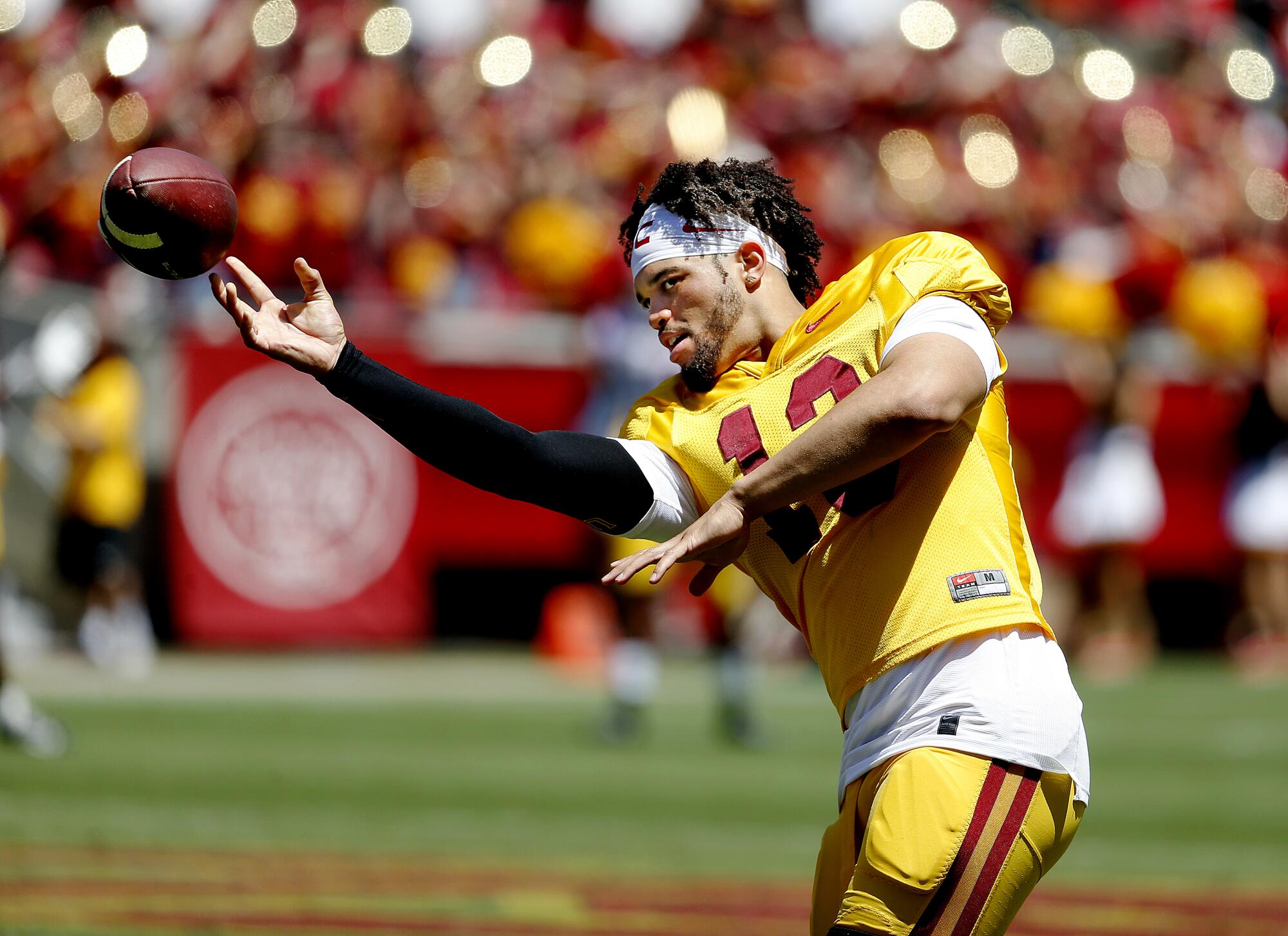
As the conversation continued, it crystallized just how much the Williamses had already considered their criteria. If it didn’t serve a specific purpose in Caleb’s portfolio, it was ruled out. If the deal required too much of Caleb’s time or distracted from football or school, Carl said, “it doesn’t matter what it paid, it’s off the table.”
They stayed away from short-term, mass-produced deals that amounted to quick cash grabs and turned down national campaigns that featured multiple players, so as to set Caleb apart from the pack.
Instead, they sought long-term agreements in which Caleb’s success could directly help the brand grow — and, in turn, help his bottom line. Deals, Thomas described, “where he wasn’t just the talent. He could be the ownership.”
“We wanted partnerships,” added Crimaldi, again emphasizing the word. “We want long-range [deals] that are going to take him through the different stages of his career.”
Waiting on those deals, as other college athletes cashed in, would require restraint in the early days of NIL.
‘The word ‘snake’ is being used a lot’: How new USC football coach Lincoln Riley may have replaced Kevin Durant as Oklahoma’s public enemy number one.
The team around Caleb also tried to be cognizant of his place on the depth chart behind quarterback Spencer Rattler, who at the time was listed as a preseason Heisman contender. They were content to wait for the right moment and the right deals, keeping emotion out of the equation as much as possible.
Every step of Caleb’s career had been carefully curated in a similar fashion. When Caleb was recruited out of high school, Carl built a comprehensive spreadsheet with weighted values in four different categories (athletics, academics, preparation and intangibles) to help him fully evaluate his options. At the time, they hoped the process would make Caleb “transfer-proof.”
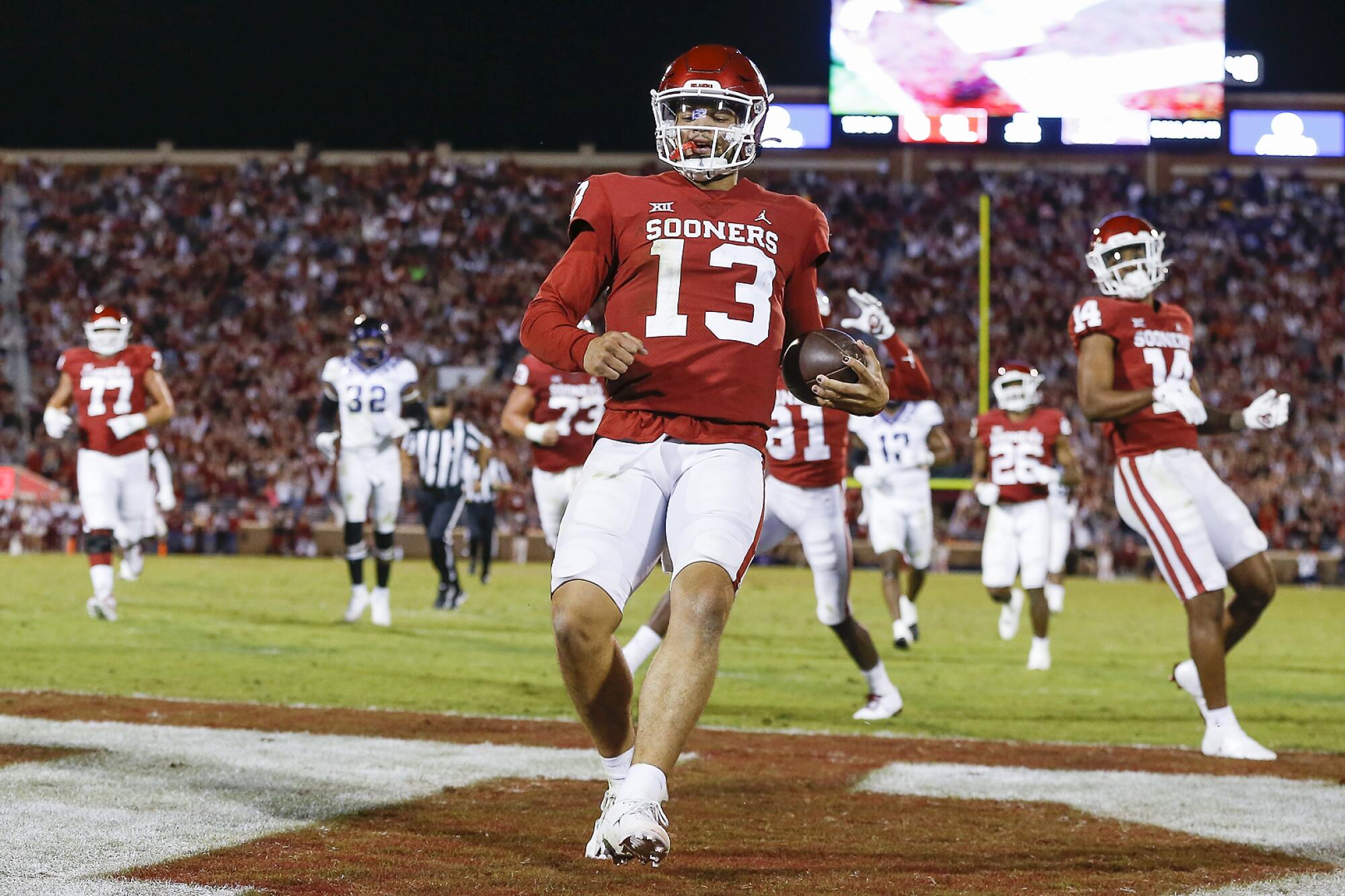
Those plans were derailed, of course, when Riley left Oklahoma for USC last November. The decision stunned the family, who’d been searching for houses in Norman, and rocked Caleb, whose bright future was suddenly in doubt. But Carl urged his son to stay patient and finish out the semester. Then, he could make an informed decision.
When he officially entered the NCAA transfer portal, the family dusted off the old spreadsheet. Many felt it was a foregone conclusion that Caleb would follow Riley to USC, but Carl insists his transfer was a product of the same comprehensive process.
“We didn’t know what we were going to do,” Carl said. “And honestly, when we went to the portal, Oklahoma was at the top of the list. But they did some things that weren’t in his best interest.”
Little about the transfer process, as Carl saw it, seemed to operate in the athlete’s best interest.
He was dismayed by the reaction of Oklahoma fans who, soon after anointing him as their savior, suddenly turned on his son. He heard all the vitriol about Caleb cashing in on his transfer choice. He resented how every step was geared to force Caleb into a hurried, emotional decision, including coaches who questioned why he would look around at all.
“I said this to Bob Stoops. I said this to Brent Venables,” Carl said. “I’ll give you the clean version. You go to college to get prepared for your career. You want to be a doctor, you go to med school at the best college you can go into. You want to be a lawyer, you do the same. What we wanted to do was be prepared to play [in the NFL on] Day One. That was the driving force.”
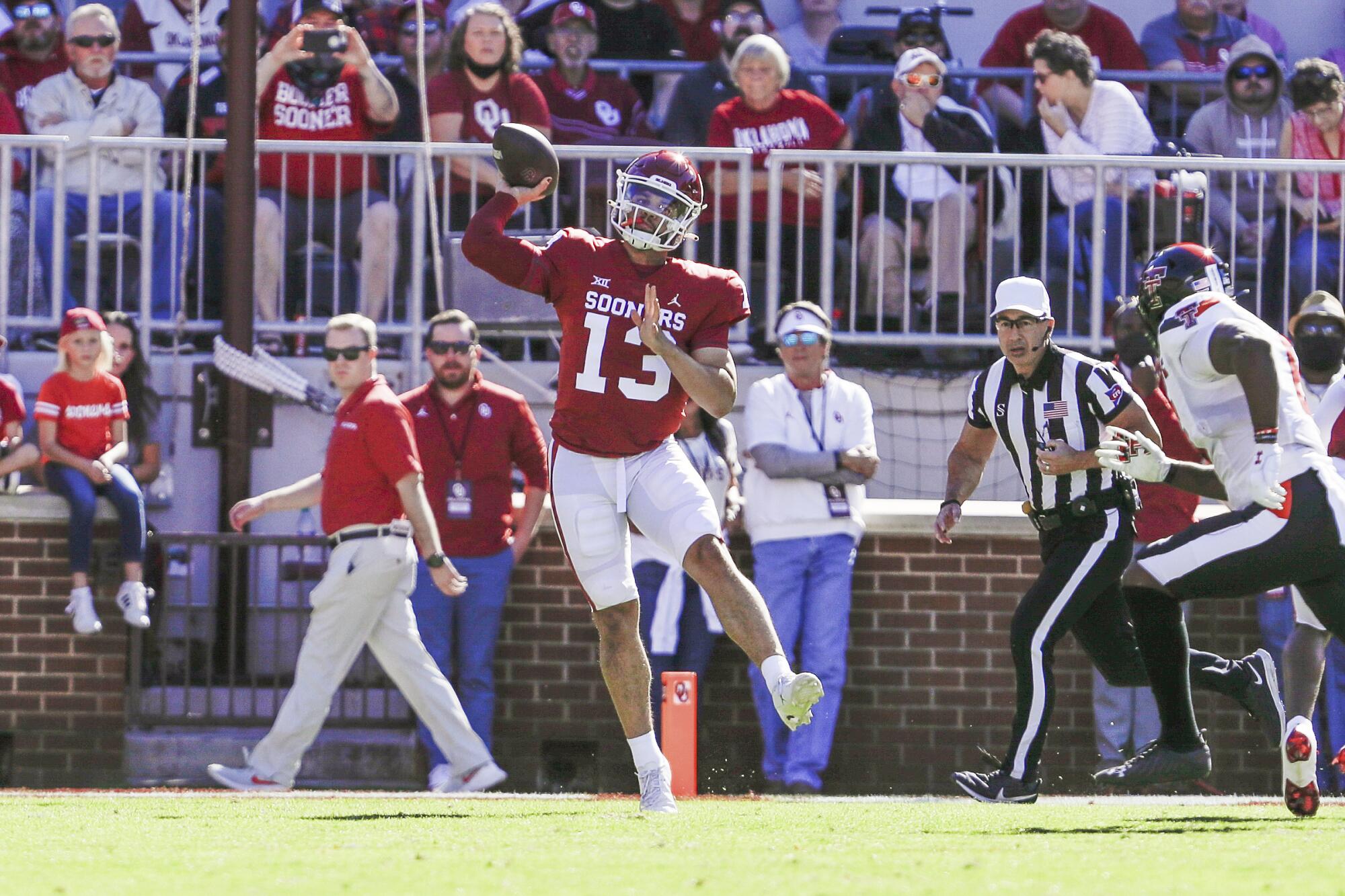
When Oklahoma welcomed transfer quarterback Dillon Gabriel the day Caleb entered the portal, the message from the Sooners’ new staff was clear.
“It didn’t faze me,” Caleb said. “But it was like, “OK, if that’s your move, I’m gonna make my move.”
Some schools offered up NIL deals to try to influence that decision. But Carl calls the conversation around those offers “laughable.” He points to 2024, when Caleb will first be draft-eligible and a convergence of media rights money and salary cap changes in the NFL are likely to send rookie deals skyrocketing.
“What’s the conversation about a million bucks right now?” Carl asks. “The conversation is to get prepared for the NFL. It’s that simple.”
That conversation ultimately led back to Riley, who has three quarterbacks currently starting in the NFL. None of those three, however, would have three years under his tutelage like Caleb.
The NIL deals started rolling out soon after he enrolled at USC. Most, according to his team, had been in the works long before he traded the plains of Oklahoma for the beaches of Southern California.
Among potential NIL partners, Beats had long been at the top of Caleb’s list. As a high school quarterback, Caleb had their headphones in nearly every color. “I was buying Beats like cleats!” Carl jokes.
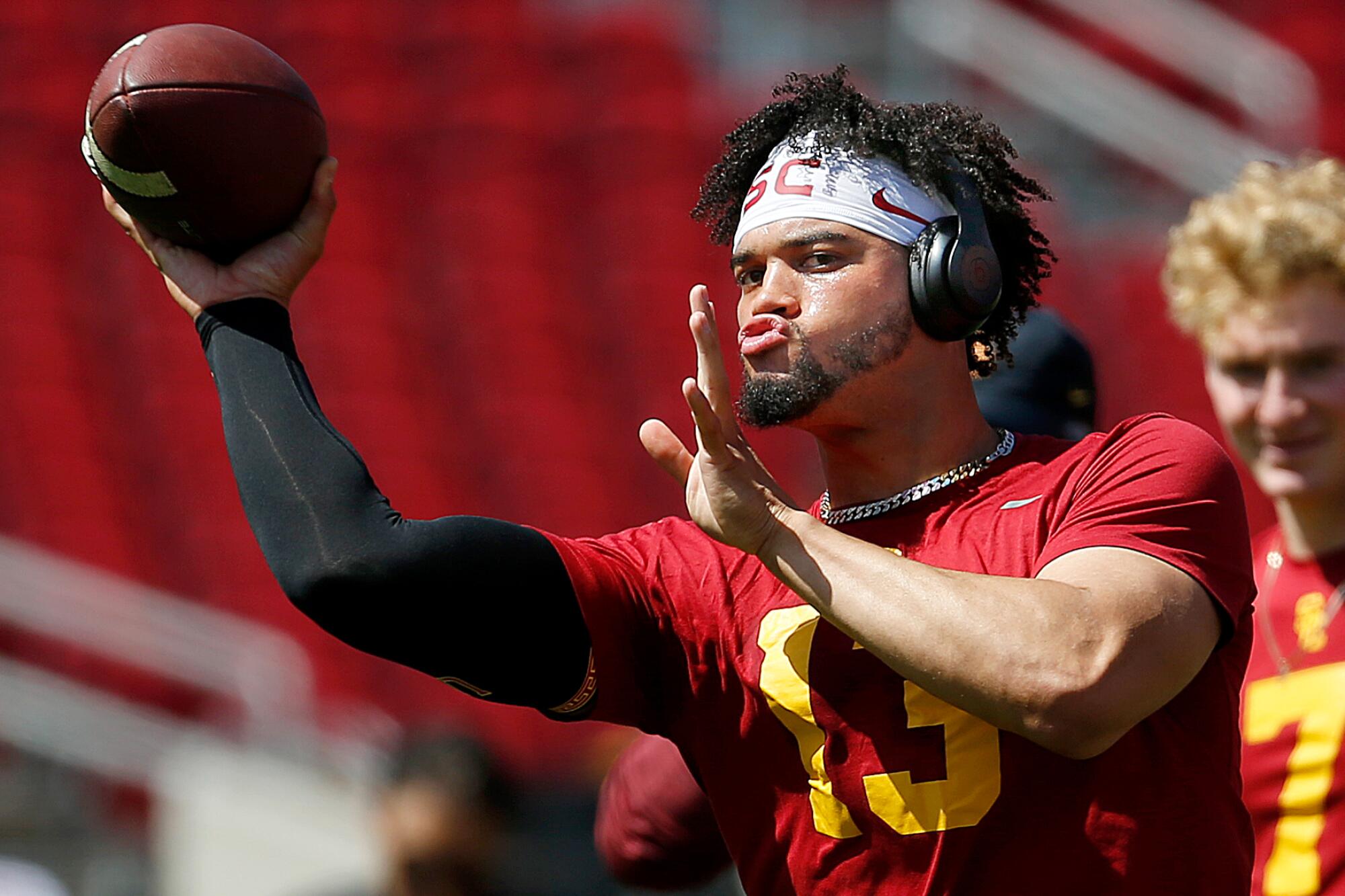
Before he’d even left high school, Beats had taken its own interest in Caleb. As chief marketing officer at Beats, Chris Thorne was always looking for unique athletes who weren’t afraid to express themselves. Caleb, who paints his nails and has his own bold style, was “the perfect fit,” Thorne said.
When they met the first time, Thorne was stunned by how far ahead Caleb and his team were thinking. He’d heard about several of the deals they’d turned down and was impressed. Their approach, he said, reminded him of luminaries such as LeBron James and Naomi Osaka, whose influence extends beyond their respective sports.
“Everyone says they’re playing the long game, but these guys actually are,” Thorne said. “He’s thinking 10 to 20 years down the line.”
It was that foresight that led Carl to seek counsel from Ross Walker, a managing partner at Hawkins Way Capital, a Beverly Hills-based real estate private equity fund. The two met before Caleb had ever enrolled at Oklahoma, but in getting to know each other, both sides saw an opportunity.
Caleb formalized that relationship in February, striking a long-term NIL deal with Hawkins Way that will pay him annual compensation while providing mentorship in the real estate space. Already, Walker said, the two sides are planning to pursue a “lifestyle hotel brand and management opportunity” in California.
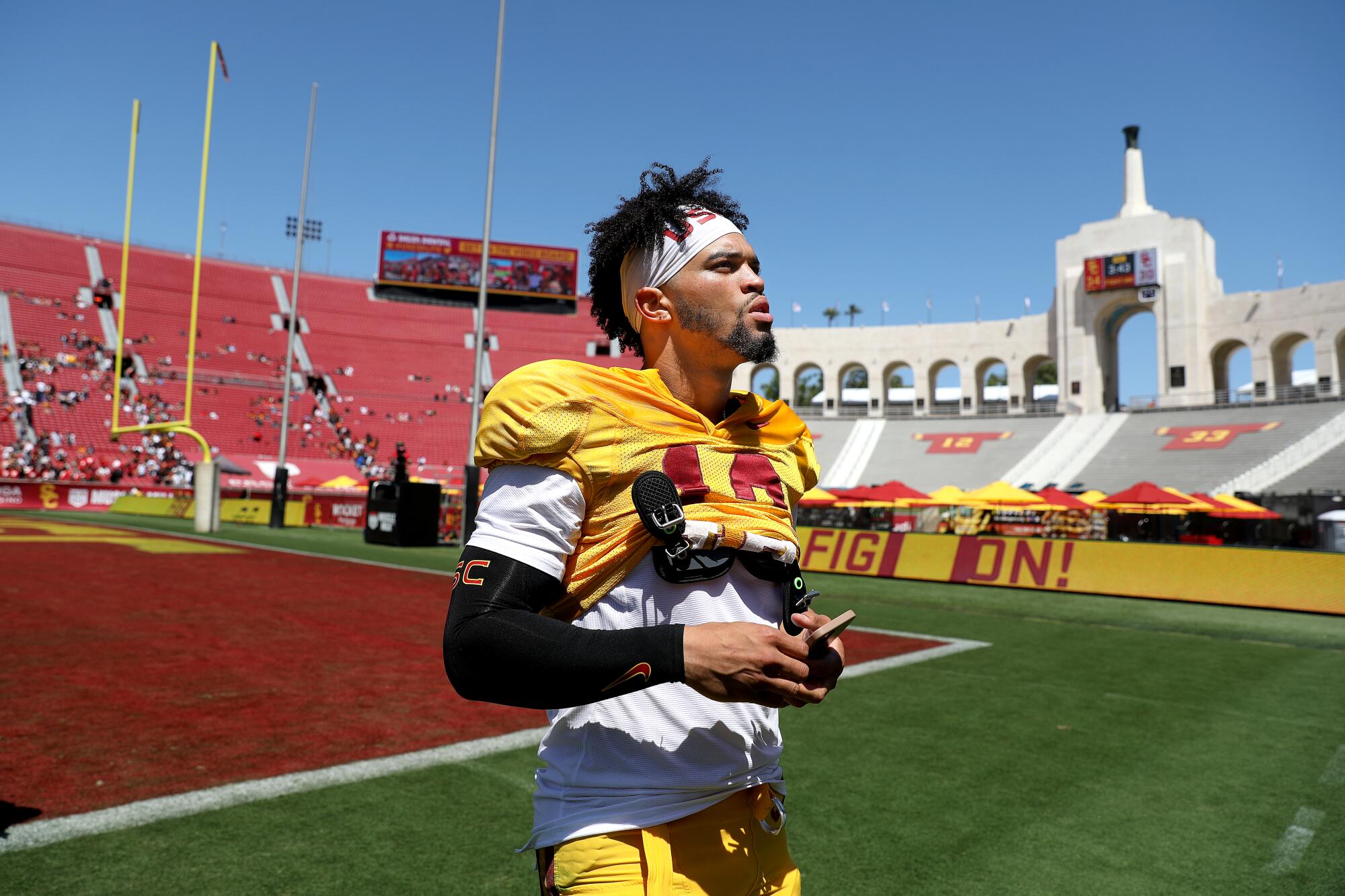
“It’s an investment in this kid,” Walker said. “We’re devoting resources to him financially but also our time, and we hope he grows into the best possible player. We’ll get something out of that for sure, but we don’t know what that is.”
Fenton Jagdeo was looking for his own investors in Faculty, his men’s grooming company, when a friend introduced him to Boulware, Caleb’s manager.
Faculty specializes in men’s nail art, so when Jagdeo found out that Caleb painted his nails, the match felt almost too good to be true.
“We’re talking about a quarterback, one of the best quarterbacks in the NCAA, he’s killing it and getting a bunch of attention for how he expresses himself,” Jagdeo said. “We thought, ‘Oh my God, this is the perfect combination.’”
And in Faculty, Caleb’s team saw its opportunity to pursue what it had planned. Not only did its mission speak directly to Caleb’s personality, but Faculty offered him a chance to do what no other college football player had to that point, lending his name, image and likeness in exchange for partial ownership of a brand.
Caleb’s team signed two more equity deals in the months that followed, the latest with a mood-changing sunglasses company, Futuremood, whose fellow investors include one of Caleb’s favorite rappers, Lil Yachty.
“[Faculty] was the first for us that kind of showed what NIL could be,” Boulware said.

Subscribers get exclusive access to this story
We’re offering L.A. Times subscribers special access to our best journalism. Thank you for your support.
Explore more Subscriber Exclusive content.
The possibilities of where NIL goes from here, his team said, are boundless. More brands are eager to be associated with Caleb, whose preseason hype seems bound for the stratosphere. More deals are expected to be announced in the coming weeks, too, just as anticipation for his USC debut reaches a fevered pitch.
Their success is the product of a father’s determination and a PR firm’s innovation, all in the name of elevating Caleb’s brand. But his father stresses it’s Caleb who ultimately calls the shots. He’s been preparing him for years to do just that.
“He is learning the ropes,” Carl said. “I call him the CEO all the time. It’s up to him to make the decisions. This isn’t me.”
There’s a lesson that Caleb Williams learned long ago from his father, one that’s been at the front of his mind during the past year amid the chaotic free-market blitz across college football.
“Always come in with my number,” Williams says. “He used to always tell me that. Come in with my number, and if they don’t want it, well — you know your own value.”
He was thinking about that lesson again while he sat in the Coliseum bleachers last month, looking out over an empty stadium, his new city beckoning in the background. For all the dollar numbers and equity stakes that his team has sought to secure over the past year, Williams is well aware the true measure of his might will come this fall on that field below.
For all that his team has done to prepare him for this opportunity at USC, it’s now up to him to follow through on the blueprint it has laid.
In L.A., no one knows how to quantify Williams’ arrival just yet. But six months is enough for Williams to know that the city suits him. In Norman, he was constantly reminded of his status — he couldn’t leave his apartment without drawing attention.
Caleb Williams is equally confident leading USC’s football workouts and participating in photo shoots for his growing NIL endorsement portfolio.
Here, as he sat down to dinner one night recently, the Kardashians and their entourage streamed into the restaurant, drawing all the eyes in the room.
From his table, one of the faces of college football’s new NIL era basked in his anonymity. “Nobody knows who I am,” he said, with a smile.
For now, maybe. But if all goes as his team has planned, one day soon all eyes will be on him.
- Share via
Watch L.A. Times Today at 7 p.m. on Spectrum News 1 on Channel 1 or live stream on the Spectrum News App. Palos Verdes Peninsula and Orange County viewers can watch on Cox Systems on channel 99.
More to Read
Go beyond the scoreboard
Get the latest on L.A.'s teams in the daily Sports Report newsletter.
You may occasionally receive promotional content from the Los Angeles Times.


